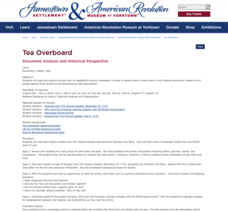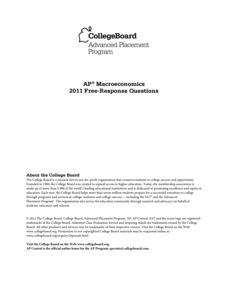College Board
2013 AP® Microeconomics Free-Response Questions
People often set off fireworks to celebrate. What is the cost of the annoyance of their neighbors? Economics help answer that question! Learners consider this problem, along with prompts on price and competition, using College Board...
College Board
2014 AP® Microeconomics Free-Response Questions
What effect do dynamics, monopolies, and the balance of skilled and unskilled labor have on a market place? How does supply affect the price of gasoline? Learners consider these questions and more using College Board materials as they...
College Board
2015 AP® Microeconomics Free-Response Questions
Two sandwich shops must decide whether it's to their benefit to set pricing together. What happens when the government also intervenes with a price subsidy? Learners consider these questions as they tackle prompts from College Board....
Jamestown-Yorktown Foundation
Why Did Some Colonial Virginians Seek Independence?
To understand the reasonings of those colonials who sought independence from England, young historians are divided into content groups that examine documents related to either the Boston Tea Party, the Yorktown Tea Party, Tea Overboard,...
Jamestown-Yorktown Foundation
Tea Overboard
While less well known than the event in Boston, the Yorktown Tea Party was equally decisive in turning community sentiment against Great Britain. To gain an understanding of why the colonists objected to the Tea Act, young historians...
Jamestown-Yorktown Foundation
Life of a Private Lesson Plan
In order to understand the challenges the Continental Army faced during the American Revolution, class members analyze primary source materials including a soldier's journal and an officer's letter, and watch a short reenactment video.
College Board
2011 AP® Macroeconomics Free-Response Questions
Foreign exchange rates have a ripple effect on economies worldwide. A case study asks scholars to examine what would happen to international investment and capital after tweaking variables that can ricochet around the world. A second...
College Board
2018 AP® Microeconomics Free-Response Questions
How much should Nirali study for her history and economics exams if she has a limited amount of time for both? Scholars consider opportunity cost in using this real-world scenario from College Board. Other questions include looking at a...
College Board
2017 AP® Macroeconomics Free-Response Questions
Learners get extra practice graphing complicated economic concepts using authentic College Board materials. Problem sets include examinations of consumer versus capital goods, and the effects of various financial policies on an economy...
Jamestown-Yorktown Foundation
How Did Relations between Britain and the Colonies Change after the French and Indian War?
What does the French and Indian War have to do with the American Revolution? Following the war, Britain issued the Proclamation of 1763 in an attempt to limit the colonists' western expansion. To understand how the proclamation, the...
Jamestown-Yorktown Foundation
Why Did Some Colonial Virginians Continue to Support the King?
Not all colonials supported the American Revolution. A resource from the American Revolution Museum at Yorktown ask young historians to investigate the reasons why some colonial Virginians were loyalist and continued to support King...
College Board
2017 AP® Microeconomics Free-Response Questions
How much corn does a farmer need to grow if he wants to make a profit? A prompt from College Board asks learners to put themselves in the boots of a farmer growing crops for the alternative fuel market. Additional prompts consider the...
College Board
2007 AP® Psychology Free-Response Questions
It's hard to make friends, and psychology helps explain why. Learners examine a case study where a new member to a club is looking to form friendships. What helps and what can get in the way? A second question asks scholars to examine...
College Board
2003 AP® Macroeconomics Free-Response Questions Form B
Learners consider production possibilities using an authentic test question from College Board. Other questions include practicing supply and demand curves and examining the effects of inflation, employment, and other variables on a...
College Board
2016 AP® Microeconomics Free-Response Questions
How can a bakery—one of several in town—maximize its profits? A case study from College Board asks scholars to consider the question. Other practice queries examine the price and benefits of buying certain goods for one consumer and look...
Judicial Learning Center
The Power of Judicial Review
Marbury v. Madison is arguably the most important landmark case in the history of the Supreme Court. A fact-filled lesson provides background information about the case and two others related to the concept of judicial review. Scholars...
Judicial Learning Center
Your 4th Amendment Rights
Americans love to learn about their rights, especially those that protect them from the government's power to invade their privacy. Young people are especially engaged by this topic. An informative lesson explores four Supreme Court...
Judicial Learning Center
Your 1st Amendment Rights
Why should classes care about the First Amendment? An engaging lesson serves as a powerful tool for answering just that. As all four cases in the lesson relate directly to freedom of expression in schools, young scholars explore the...
Judicial Learning Center
Why Study Landmark Cases?
Why study landmark Supreme court cases? A helpful lesson offers a brief but valuable argument for the importance of these cases in the field of criminology. It introduces scholars to some key terms necessary for studying court cases and...
Judicial Learning Center
Types of Court Cases
How can one court acquit someone of a crime, while another convicts the person of the same one? It's all because of the differences between civil and criminal trials. An informative resource provides scholars in the field of criminology...
Judicial Learning Center
Getting Ready for Trial
A courtroom can be a scary place for the uninitiated. Get familiar with the process using a helpful overview of the activities that take place prior to both civil and criminal cases. The lesson explains the differences between...
Judicial Learning Center
Your Day in Court
Whether out of choice or necessity, people want to know what will happen on a typical day in court. A helpful lesson walks scholars in the field of criminology through the trial process from opening statements to the final verdict.
Judicial Learning Center
The Appeal Process
Why doesn't the Supreme Court hear testimony from witnesses? How do they complete an entire proceeding in less than two hours? A helpful lesson guides scholars of criminology through these and other questions by explaining how appeals...
Judicial Learning Center
The Players in the Courtroom
Courtrooms are complicated. In addition to the many rules, there are a number of people whose jobs are not very clear to the casual courtroom observer. With the resource, individuals identify some of these roles and review more...























